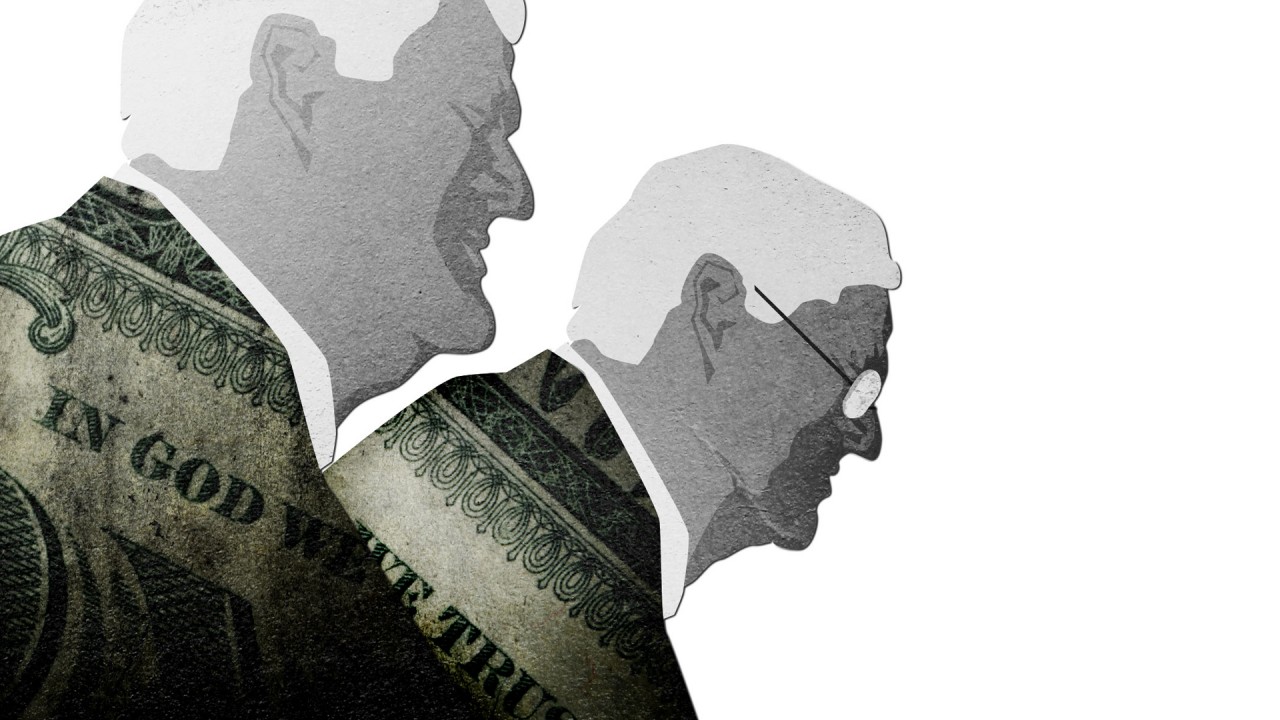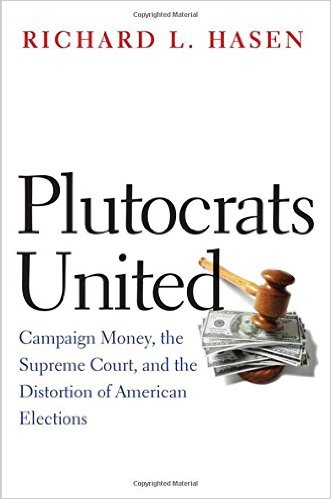
(Image: Jared Rodriguez/Truthout/Flickr cc 2.0)
This article originally appeared in Washington Monthly.
Two thousand and eight was a discouraging year for anyone concerned about the role of money in politics. The presidential race between Barack Obama and John McCain was the most expensive in history (according to opensecrets.org, which tracks campaign spending), and outside spending on federal races reached the unprecedented sum of $338 million, about a 50 percent jump from 2004.
How quaint that seems today. In 2012, the first presidential election cycle following the Supreme Court’s 2010 decision in Citizens United v. FEC, outside spending totaled just over $1 billion. Even that may soon resemble a rounding error; the billionaire brothers Charles and David Koch and their network of conservative donors have already pledged to spend $889 million on the 2016 campaign — likely more than either party will.
Most campaign money comes not from corporations or unions but from rich individuals. In 2012, according to the public policy think tank Demos, 159 donors accounted for nearly 60 percent of all super PAC funding, and about 93 percent came from 3,318 donors — about one-thousandth of one percent of the population. The cap on direct campaign contributions, currently $2,700 per candidate, survived Citizens United, but that money, too, comes overwhelmingly from the rich: the donors who gave more than $200 to federal candidates in 2012 represented just 0.4 percent of the population but accounted for 64 percent of campaign donations from individuals. Not many people have a spare $2,700 lying around to give to politicians.
What is wrong with so much spending by so few? According to the current Supreme Court majority, of course, nothing. In Citizens United, the Court held that the only justification for the burden that spending limits place on the First Amendment right to free speech is preventing quid pro quo corruption — that is, bribery — or its appearance. Since independent spending, even by corporations, can’t lead to quid pro quo arrangements (as long as the outside spenders don’t “coordinate” with campaigns, a dubious but not illogical assumption), there’s no justification for limiting it. Months after that decision, an appeals court extended the logic of Citizens United to its inevitable conclusion, striking down the $5,000 contribution cap for political action committees, or PACs. After all, if independent spending doesn’t corrupt, how could donations to independent organizations? Thus was born the super PAC, which can accept and spend unlimited donations from the super-rich as long as it doesn’t coordinate with the candidate it supports. It’s impossible to prove that these legal changes caused the explosion in independent spending, but it seems as though people like Sheldon Adelson are more comfortable dropping a hundred million dollars on an election when the money can be laundered through groups with anodyne names like Winning Our Future.
A number of legal scholars have responded to Citizens United by challenging the Court’s narrow definition of corruption as quid pro quo. The Harvard law professor Lawrence Lessig — whose quixotic efforts to fix the system have included a “super PAC to end all super PACs” and a run for the 2016 Democratic presidential nomination — argues that because government is supposed to be dependent “on the people alone,” unlimited campaign spending creates “dependence corruption,” a condition in which government is overly dependent on “the funders.” In her popular 2014 book, Corruption in America, Zephyr Teachout, a law professor at Fordham, writes that the Founders understood corruption in terms similar to Lessig’s: as “excessive private interests influencing the exercise of public power,” or the use of public power to pursue private ends.
The trouble with these definitions is that they cover a lot of everyday political activity that we don’t think of as corrupt. Remember, changing votes in exchange for private payments is already illegal under bribery laws. Campaign finance is about money used specifically to help win elections. Why is it more corrupt for an elected official to be dependent on campaign donations than on votes?
Imagine two senators who are running for reelection and must decide how to vote on an immigration reform bill that a slight majority of their constituents oppose. Sen. Smith agrees to vote yes in hopes of securing a million-dollar donation from George Soros to the super PAC supporting him. That looks like corruption in Teachout’s sense: the senator is basing his vote on his desire for reelection and on what George Soros thinks is right, not on what the people want.
But now suppose Sen. Jones agrees to vote yes because he wants to capture the Hispanic vote, which could prove decisive in a close race. His motives are identical to Sen. Smith’s; both are placing their interest in reelection ahead of the will of “the people.” Yet it would be bizarre to label this corruption. Embracing policies supported by passionate voters is exactly what we expect — even demand — from elected officials. And we accept that citizens will vote according to their self-interest. Theories like Lessig’s and Teachout’s don’t explain why dependence on the wealthy is corrupt but dependence on voting blocs is not.
Of course, money is different from votes. Votes, not money, are the approved currency of democracy. It’s just that the corruption theories don’t explain this difference; in fact, they obscure it. That’s one reason why Richard Hasen, in his new book, Plutocrats United, argues that it’s time to stop talking about corruption and start being honest about the real problem: inequality. “The constitutionality of campaign finance laws should not turn on whether we can fit an argument about influence into the anticorruption box,” Hasen writes. The problem with money is that, unlike votes, some people have a lot more of it than others. We object to unlimited political spending because it gives the richest Americans far more influence over government than everyone else. “It is cleaner to stop shoehorning equality concerns into broad definitions of corruption,” Hasen writes, “and to defend political equality as an interest in its own right.”
The corruption theories, Hasen explains, tend to boil down to inequality anyway. Lessig’s argument — that money causes politicians to rely too much on wealthy funders — is just another way of saying that rich people have more influence than the rest of us. Teachout’s theory of corruption as putting private interests ahead of public interests sounds appealing, but how do we know the $74 million spent by the environmentalist Tom Steyer to support Democratic candidates in 2014, for example, wasn’t in the public interest? We have to assume that public interest is, by definition, determined only through equal democratic participation.
Hasen thinks that assumption is right; it just has nothing to do with corruption. “[G]iven that we have fundamental disagreements over the meaning of the public interest,” he writes, “the best we can do is to define the public interest procedurally, by ensuring that every voter has a roughly equal chance to influence policies and elections.” In other words, what makes money different is that there’s no correlation between how rich someone is and how closely his views align with what the public wants. The problem with Sen. Smith, who wants Soros’s money, isn’t that he’s “corrupt.” It’s that letting one rich benefactor sidestep the deliberative democratic process and determine a policy choice that affects everyone seems fundamentally unfair.
Hasen finds support for this principle, which he calls “equality of inputs,” in the Supreme Court’s “one person, one vote” cases and in the line of decisions upholding campaign finance laws until Citizens United. In the 1990 case that Citizens United overruled, the majority held that the ban on corporate spending was justified by a “different type of corruption in the political arena: the corrosive and distorting effects of immense aggregations of wealth that are accumulated with the help of the corporate form and that have little or no correlation to the public’s support for the corporation’s political ideas.” That’s an argument about inequality, dressed in corruption’s clothing.
The candidate who raises the most money doesn’t always win, as Jeb Bush may be learning, but the candidate who raises none doesn’t stand a chance. The need to win the support of a tiny circle of elite donors limits the pool of candidates with a shot at winning and narrows the range of policies they can support. Whoever wins will spend much more time listening to the concerns of wealthy donors, and the lobbyists who represent them, than those of the average voter.
Hasen cites a study in which the political scientists Martin Gilens and Benjamin I. Page compared the likelihood of US policy change with the preferences of the general public and those of the richest 10 percent of Americans. They found that with respect to most aspects of US policy, “it makes very little difference what the public thinks. The probability of policy change is nearly the same (around [30 percent]) whether a tiny minority or a large majority of average citizens favor a proposed policy change.” On the other hand, “a proposed policy change with low support among economically elite Americans (one out of five in favor) is adopted only about 18 percent of the time, while a proposed change with high support (four out of five in favor) is adopted about 45 percent of the time.”
The notion that government is too responsive to millionaires and billionaires is so intuitive — according to a recent New York Times poll, 66 percent of Americans agree that the wealthy have more influence on elections than other Americans, and 84 percent believe that money has too much influence — that it may seem incredible that there’s any debate about it. But the Supreme Court has never accepted political equality as an interest sufficient to justify the burden that, according to the Court, campaign finance regulations place on free speech. The Roberts Court has even suggested that the purpose of leveling the playing field would render an otherwise constitutional law unconstitutional.
So it makes sense for scholars who favor campaign finance laws to avoid talking about political equality. In his book Citizens Divided, Yale Law School Dean Robert Post casts the issue as one of “electoral integrity”: rampant campaign spending makes voters less likely to participate in the political system because they think rich donors call the tune. But this theory, too, amounts to a one-step-removed critique of political inequality. “Major legal scholars such as Post,” Hasen writes, “seem to be looking for ways to reverse Citizens United without overtly relying on equality interests and without overturning longstanding First Amendment doctrine.”
Hasen has a wake-up call for his colleagues: all the theorizing in the world isn’t going to make Justice Anthony Kennedy, whose majority opinion in Citizens United accused the government of using “censorship to control thought,” change his mind. At the same time, as discouraging as Citizens United has been for Americans who want to reduce the role of money in politics, Hasen reminds them that change is only one judicial appointment away. The uneasy Supreme Court consensus allowing limits on direct contributions and corporate and union spending lasted until 2006, when Justice Sandra Day O’Connor retired and was replaced with Justice Samuel Alito. If one of the Court’s conservatives retires (or dies, macabre as that sounds) during a Democratic presidency, the 5-4 balance in favor of restrictions should swing the other way.
That means the future of campaign finance reform likely depends on the upcoming presidential election. Kennedy and Justice Antonin Scalia are both 79 years old; the liberal Justices Stephen Breyer and Ruth Bader Ginsburg are 77 and 82, respectively. A Democratic president could get the chance to install a new and potentially long-lasting liberal majority; a Republican could push the Court even further to the right.
Hasen isn’t saying that spending limits are constitutionally required, just that they should be permissible to further the interest of equality of inputs. Nor is he arguing for anything close to absolute equality. He takes seriously the argument that limiting how much a person can spend implicates the First Amendment. So he proposes a system that combines what he calls “level up” and “level down” provisions: election-spending vouchers for all voters and a generous cap on individual contributions and expenditures. (He suggests $100 vouchers and spending limits of $25,000 per candidate and $500,000 per election.)
But Hasen notes that even a new liberal Supreme Court majority isn’t guaranteed to accept the equality rationale or overturn the long-standing prohibition on independent expenditure limits. That’s why he urges his fellow reformers to give up on the corruption idea and work to develop the strongest possible equality-based argument. “Reformers,” he writes, “must demonstrate to the new Court that reasonable limits on corporate and even individual spending, when coupled with generous public financing, would not squelch competition or inhibit robust debate,” and persuade the justices “to publicly accept a political equality interest that could justify reasonable campaign finance regulation, consistent with progressive values.” Plutocrats United is his contribution to the cause.
Anyone who is worried about the role of money in politics should take a clear message from Hasen’s book: it’s all about 2016. Polls show campaign finance to be a low priority for most voters, but the excessive influence of wealth distorts government policy on things that people do care about, like economic regulation, taxation, and health care, and that they should care about but don’t, like climate change. As income inequality grows, so will the power of the tiny donor class, which will in turn make it ever harder to enact policies aimed at reversing that inequality. There’s no way of getting around the irony: only the power of a majority vote has a chance of curtailing the power of money to undermine the principle of majority rule. Citizens interested in overturning Citizens United should consider uniting.
This article was reprinted with the permission of Washington Monthly.





